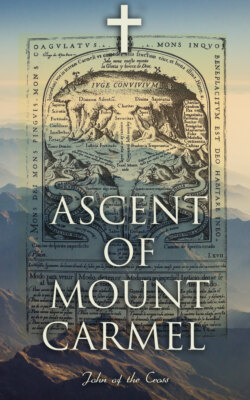Читать книгу Ascent of Mount Carmel - John of the Cross - Страница 7
На сайте Литреса книга снята с продажи.
II OUTSTANDING QUALITIES AND DEFECTS OF THE SAINT’S STYLE
ОглавлениеThe profound and original thought which St. John of the Cross bestowed upon so abstruse a subject, and upon one on which there was so little classical literature in Spanish when he wrote, led him to clothe his ideas in a language at once energetic, precise and of a high degree of individuality. His style reflects his thought, but it reflects the style of no school and of no other writer whatsoever.
This is natural enough, for thought and feeling were always uppermost in the Saint: style and language take a place entirely subordinate to them. Never did he sacrifice any idea to artistic combinations of words; never blur over any delicate shade of thought to enhance some rhythmic cadence of musical prose. Literary form (to use a figure which he himself might have coined) is only present at all in his works in the sense in which the industrious and deferential servant is present in the ducal apartment, for the purpose of rendering faithful service to his lord and master. This subordination of style to content in the Saint’s work is one of its most eminent qualities. He is a great writer, but not a great stylist. The strength and robustness of his intellect everywhere predominate.
This to a large extent explains the negligences which we find in his style, the frequency with which it is marred by repetitions and its occasional degeneration into diffuseness. The long, unwieldy sentences, one of which will sometimes run to the length of a reasonably sized paragraph, are certainly a trial to many a reader. So intent is the Saint upon explaining, underlining and developing his points so that they shall be apprehended as perfectly as may be, that he continually recurs to what he has already said, and repeats words, phrases and even passages of considerable length without scruple. It is only fair to remind the reader that such things were far commoner in the Golden Age than they are to-day; most didactic Spanish prose of that period would be notably improved, from a modern standpoint, if its volume were cut down by about one-third.
Be that as it may, these defects in the prose of St. John of the Cross are amply compensated by the fullness of his phraseology, the wealth and profusion of his imagery, the force and the energy of his argument. He has only to be compared with the didactic writers who were his contemporaries for this to become apparent. Together with Luis de Granada, Luis de León, Juan de los Ángeles and Luis de la Puente,20 he created a genuinely native language, purged of Latinisms, precise and eloquent, which Spanish writers have used ever since in writing of mystical theology.
The most sublime of all the Spanish mystics, he soars aloft on the wings of Divine love to heights known to hardly any of them. Though no words can express the loftiest of the experiences which he describes, we are never left with the impression that word, phrase or image has failed him. If it does not exist, he appears to invent it, rather than pause in his description in order to search for an expression of the idea that is in his mind or be satisfied with a prolix paraphrase. True to the character of his thought, his style is always forceful and energetic, even to a fault.
We have said nothing of his poems, for indeed they call for no purely literary commentary. How full of life the greatest of them are, how rich in meaning, how unforgettable and how inimitable, the individual reader may see at a glance or may learn from his own experience. Many of their exquisite figures their author owes, directly or indirectly, to his reading and assimilation of the Bible. Some of them, however, have acquired a new life in the form which he has given them. A line here, a phrase there, has taken root in the mind of some later poet or essayist and has given rise to a new work of art, to many lovers of which the Saint who lies behind it is unknown.
It is perhaps not an exaggeration to say that the verse and prose works combined of St. John of the Cross form at once the most grandiose and the most melodious spiritual canticle to which any one man has ever given utterance. It is impossible, in the space at our disposal, to quote at any length from the Spanish critics who have paid tribute to its comprehensiveness and profundity. We must content ourselves with a short quotation characterizing the Saint’s poems, taken from the greatest of these critics, Marcelino Menéndez Pelayo, who, besides referring frequently to St. John of the Cross in such of his mature works as the Heterodoxos, Ideas Estéticas and Ciencia Española, devoted to him a great part of the address which he delivered as a young man at his official reception into the Spanish Academy under the title of ‘Mystical Poetry.’
‘So sublime,’ wrote Menéndez Pelayo, ‘is this poetry [of St. John of the Cross] that it scarcely seems to belong to this world at all; it is hardly capable of being assessed by literary criteria. More ardent in its passion than any profane poetry, its form is as elegant and exquisite, as plastic and as highly figured as any of the finest works of the Renaissance. The spirit of God has passed through these poems every one, beautifying and sanctifying them on its way.’
